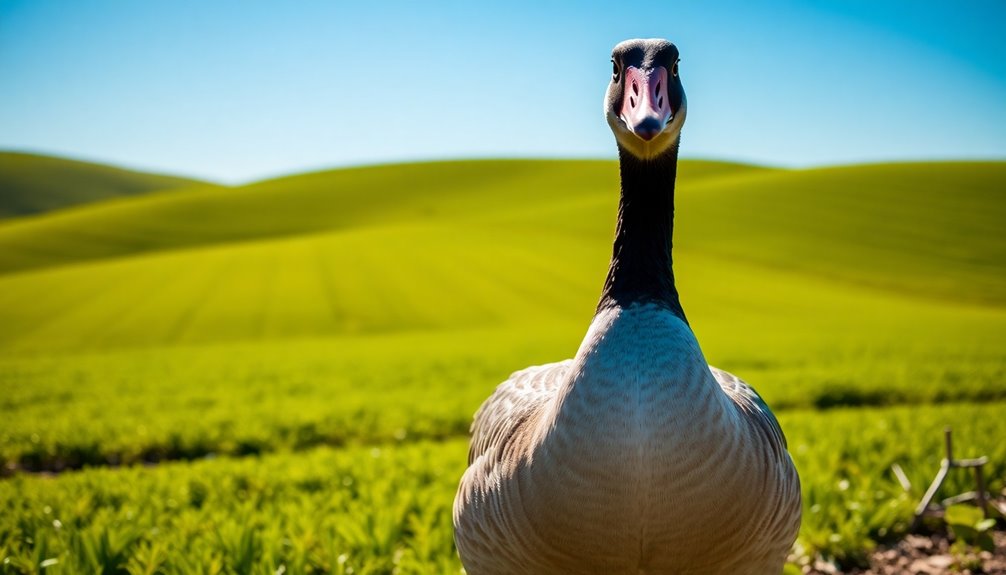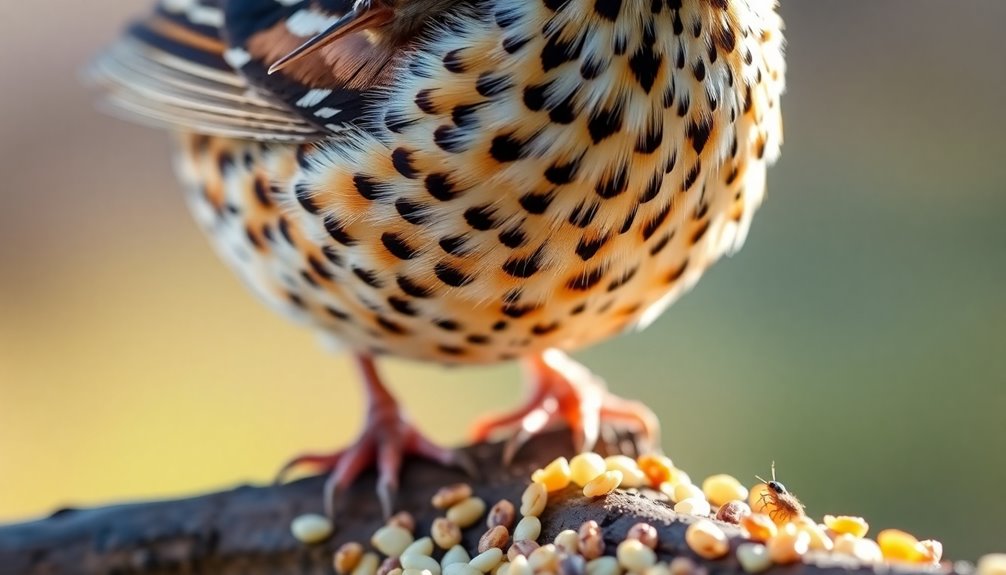Guard geese are fantastic protectors for your farm. Their loud honking acts as an alarm, warning you of potential threats. Geese have strong territorial instincts, which discourage intruders and predators from getting too close. Plus, they require minimal feeding costs, mostly grazing on grass. To maximize their protective abilities, bonding with your geese is essential; they'll become more vigilant when integrated into a flock. Consider the best breeds for guarding, like Chinese or African geese, to enhance your security. Stick around to explore more about how to choose and raise these loyal feathered guardians effectively.
Key Takeaways
- Guard geese serve as effective alarm systems, alerting to threats with loud honking and strong territorial instincts.
- Flocks enhance vigilance and protection, with increased numbers creating a formidable defense against intruders.
- Proper bonding and social interaction within the flock strengthen protective instincts and reduce aggression.
- Raising goslings with chicks fosters their natural guarding instincts, ensuring they grow into reliable protectors.
- Recommended breeds like Chinese and African geese are particularly effective due to their alertness and territorial behaviors.
Benefits of Guard Geese
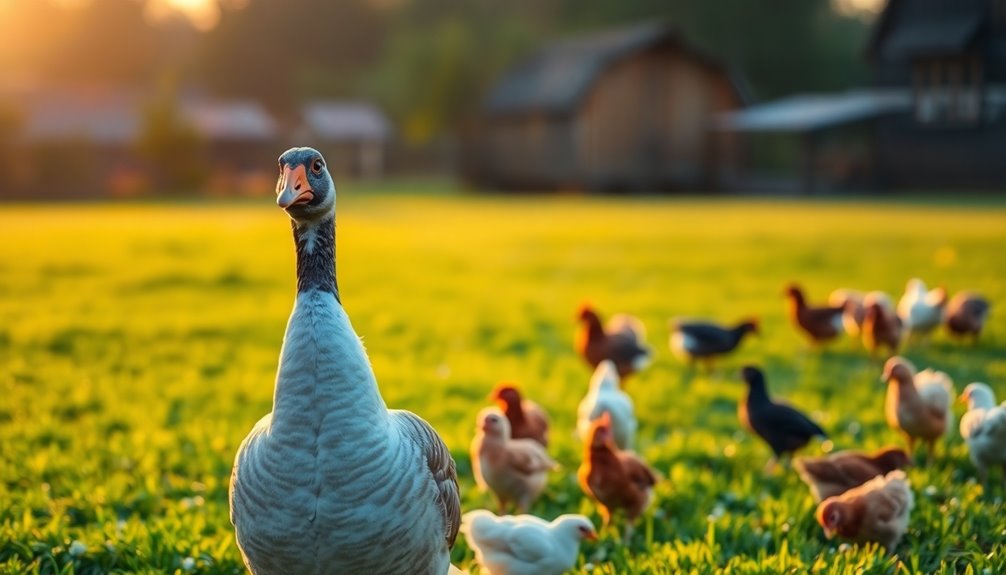
When it comes to farm security, the peace of mind that guard geese provide is invaluable. A guard goose acts as an effective alarm system, using its loud honking to alert you to potential predators lurking around your flock.
These guard animals are particularly beneficial for protecting chickens, as they possess strong territorial instincts that deter intruders. Plus, they require minimal feeding costs, primarily thriving on grass, making them a cost-effective solution.
Unlike traditional livestock guardian dogs, guard geese offer a unique approach to predator protection. When properly bonded with your flock, they can develop protective behaviors that enhance the overall safety of your farm, ensuring your birds stay secure and sound.
Bonding With Your Goose
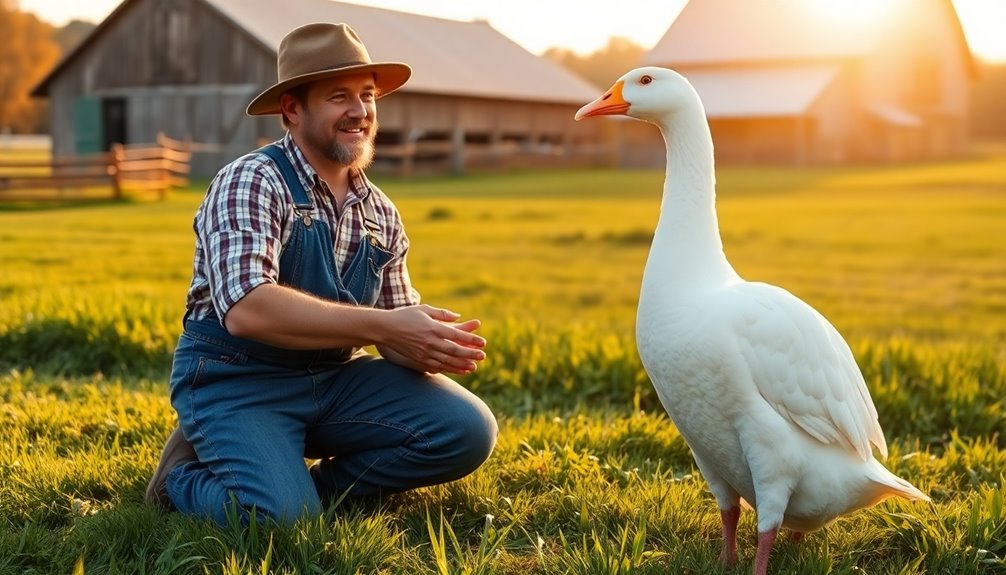
How do you guarantee your guard goose effectively protects your flock?
Start with bonding. A well-bonded goose is much more likely to defend chickens against predators. When you introduce your goose to a new environment, allow time for bonding to occur; this enhances its protective instincts.
As your goose grows attached to the flock, its territorial instincts will develop, making it more vigilant. The noises your goose makes serve as essential warning signals, alerting the flock to nearby threats.
If bonding is lacking, your guard animal may prioritize its own safety over that of your chickens. Successful integration of goslings with chicks encourages protective behaviors, ultimately enhancing the overall safety of your farm.
Hatching Your Guard Goose
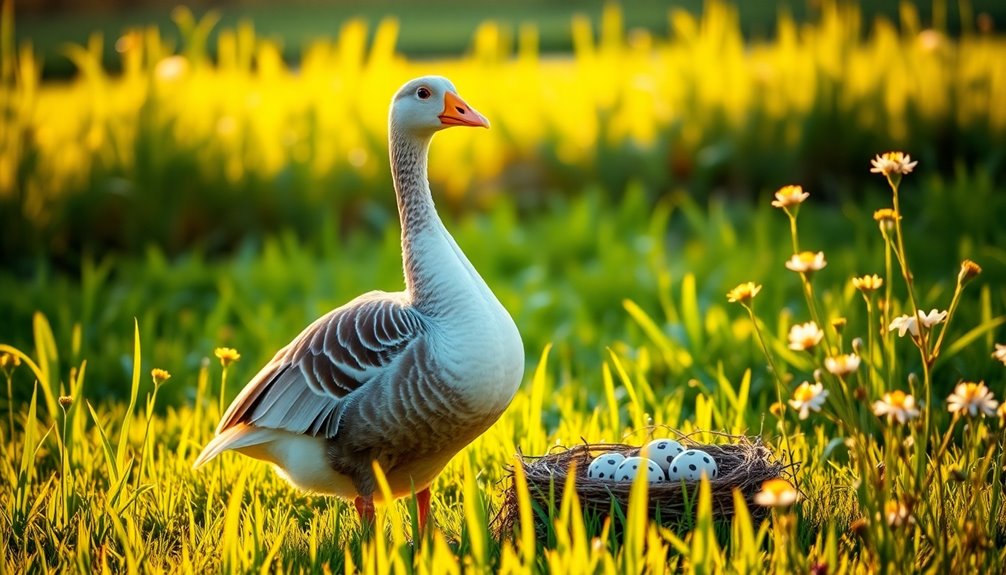
Hatching your guard goose starts with creating ideal incubation conditions, as goose eggs need the right environment to thrive.
You'll want to monitor the temperature and humidity closely and avoid opening the incubator during critical hatching days.
Once the goslings arrive, raising them alongside chicks can help build strong bonds essential for their protective instincts.
Ideal Incubation Conditions
Creating the perfect environment for incubating goose eggs is vital for a successful hatch. A reliable incubator, like those from Brinsea, guarantees you maintain the right conditions for these sensitive eggs.
Aim for a temperature around 99.5°F and adjust humidity based on the air cell size; this dry hatching method enhances hatch rates. Regularly candle your goose eggs every 3-4 days to monitor embryo development and spot any non-viable eggs early.
Patience is key as goslings typically take 28 to 35 days to hatch; don't rush the process just because you see pipping. Proper ventilation in the incubator is essential for the health and viability of your eggs throughout this incubation journey.
Raising Goslings Together
Raising goslings alongside chicks not only fosters bonding but also cultivates the protective instincts crucial for your guard goose.
As goslings hatch between days 28 and 35, you'll need patience and care during this critical period. Integrating goslings with chicks enhances the likelihood that your goose will develop strong territorial instincts in a familiar environment.
Regularly monitor their development by candling every 3-4 days to confirm successful hatching and overall health. Providing a safe and spacious environment for both goslings and chicks is essential to prevent stress and promote harmonious interactions as they grow. Additionally, understanding animal behavior can help you anticipate any potential threats to your flock.
Effective Hatching Techniques
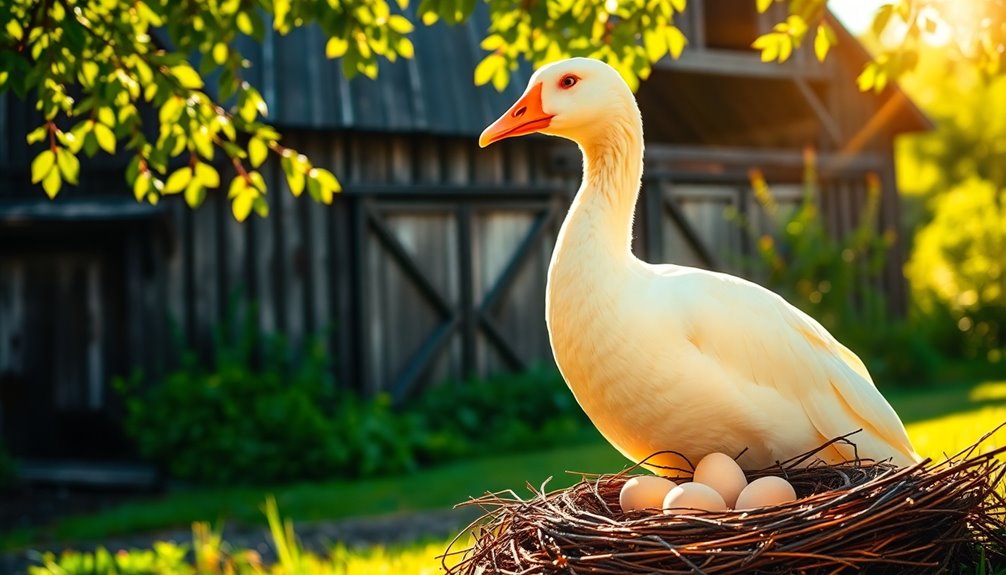
When it comes to effective hatching techniques for goose eggs, mastering humidity control and egg turning can make all the difference.
Consider using dry hatching and monitoring the air cell size to maintain ideal humidity levels, which can greatly improve your hatch rates. You'll want to turn the eggs manually or invest in an automatic turner to guarantee consistent development during incubation.
Regularly candle the eggs every 3-4 days to check on embryo growth and health, allowing for timely interventions if needed. Remember, adjusting humidity based on air cell size helps prevent shrink wrapping of embryos.
Finally, be patient; goslings usually hatch between days 28 and 35, and pipping doesn't mean they'll hatch right away.
Timing and Care for Goslings
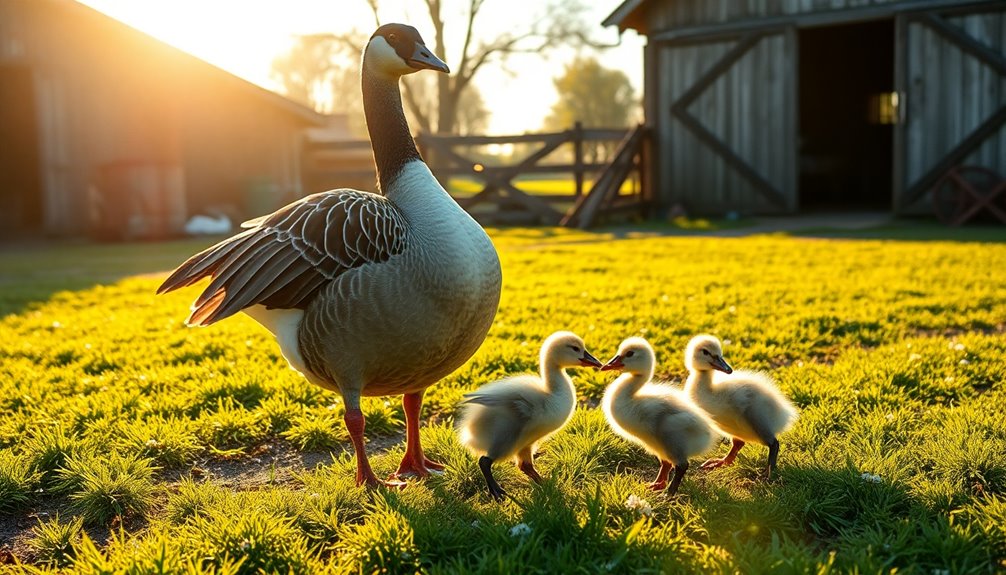
Timing is essential in the care of goslings, as they typically hatch between 28 and 35 days. You'll need to monitor them closely during this period to guarantee a successful outcome.
Remember, opening the incubator while they're hatching can risk shrink wrapping the embryos, so patience is vital; pipping doesn't guarantee immediate hatching.
Raising goslings alongside chicks is recommended to encourage bonding, which enhances their effectiveness as guard geese.
Regularly candle the eggs every 3-4 days to track development and adjust humidity levels based on the air cell size for better hatch success.
Once they hatch, provide adequate shelter, clean water, and a balanced diet to promote their health and growth.
Proper care sets the stage for strong guardians on your farm.
Understanding Guard Goose Myths
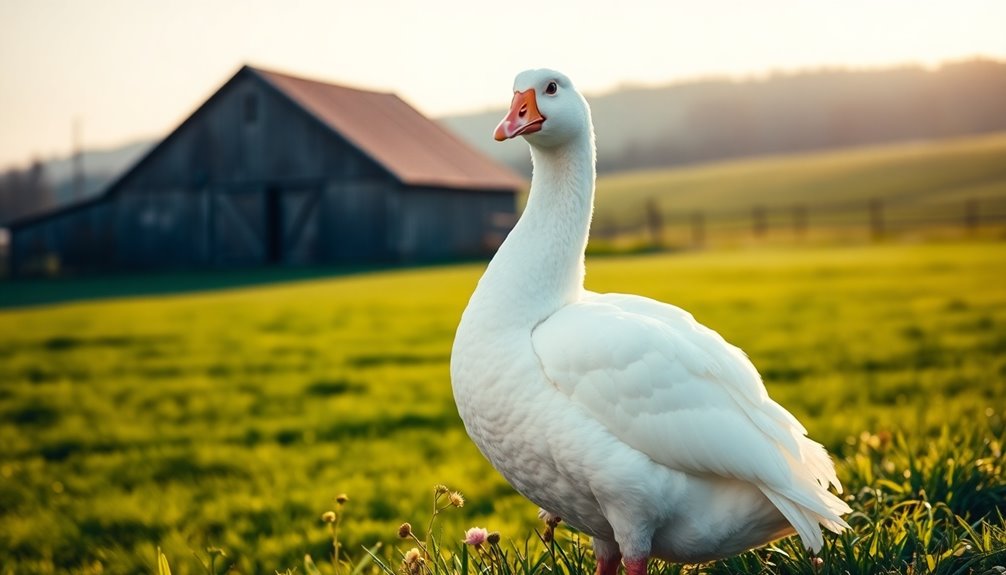
Although many believe that geese are the ultimate guardians for a farm, it's essential to separate fact from fiction.
The common myth that a single goose can effectively protect a chicken flock is misleading, as geese often prioritize self-preservation over guarding unrelated animals.
While it's true that geese can alert you to danger, their protective instincts primarily deter aerial predators like hawks and eagles, not terrestrial threats such as coyotes or raccoons.
Anecdotal evidence may exaggerate geese's capabilities, leading to misconceptions.
Additionally, their territorial instincts develop over time, and if they lack bonding with the flock, they may not act as a good guard.
Social Needs of Geese
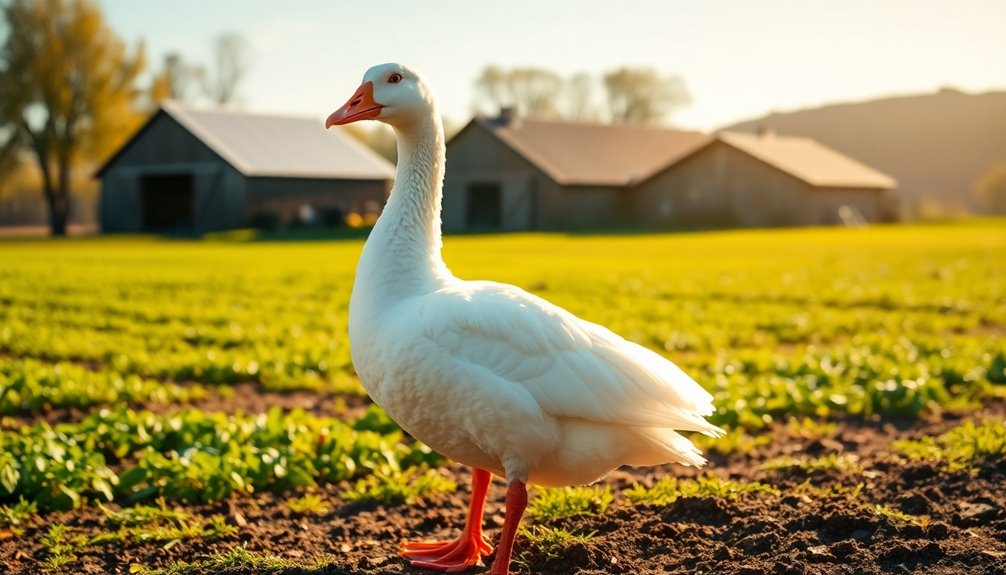
Geese are highly social creatures that thrive in groups, so having at least two geese is vital to keep them happy and healthy.
When you keep multiple geese together, they enjoy important social interactions that promote their mental well-being. A lone goose may experience loneliness and stress, leading to behavioral issues that can affect its overall health.
Unlike chickens, geese offer unique communication and companionship that enhances their protective instincts. A goose knows how to bond and socialize with its kind, which is essential for a harmonious environment.
By providing companionship, you not only improve their quality of life but also bolster their effectiveness as guardians on your farm.
Challenges of a Single Goose
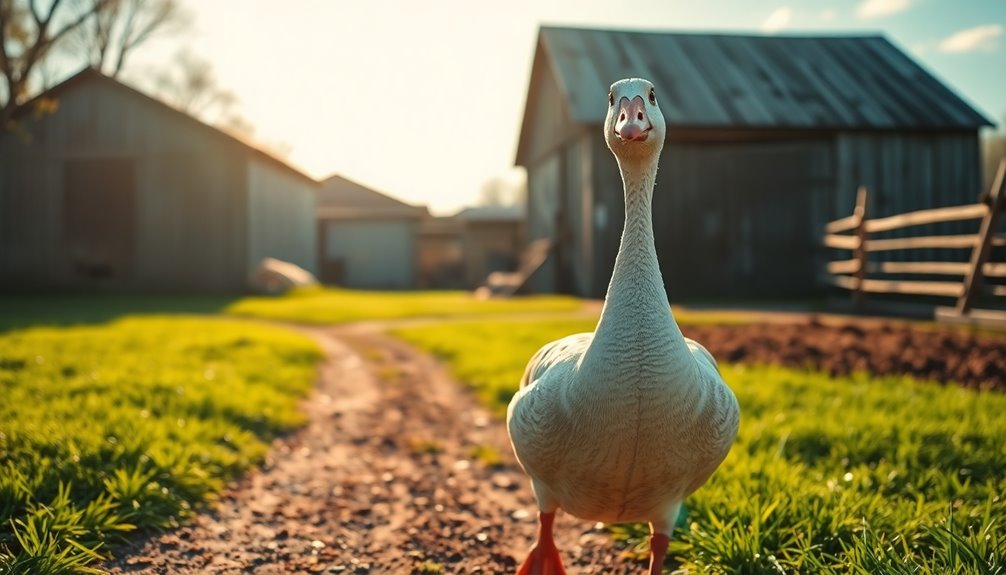
Keeping a single goose can lead to significant challenges that affect its overall well-being. Geese are social animals, and without companionship, your lone gander might experience loneliness and stress, resulting in behavioral issues.
This lack of social interaction can hinder its natural guarding instincts, leaving your farm vulnerable. During breeding season, male geese might become aggressive, posing risks to your hens and potentially causing injuries.
Additionally, a solitary goose may attempt to mate with hens, which can lead to harm due to size differences. To guarantee effective guarding and meet social needs, it's essential to keep at least two geese together.
This way, they can support each other and provide better protection for your farm.
Advantages of Multiple Geese
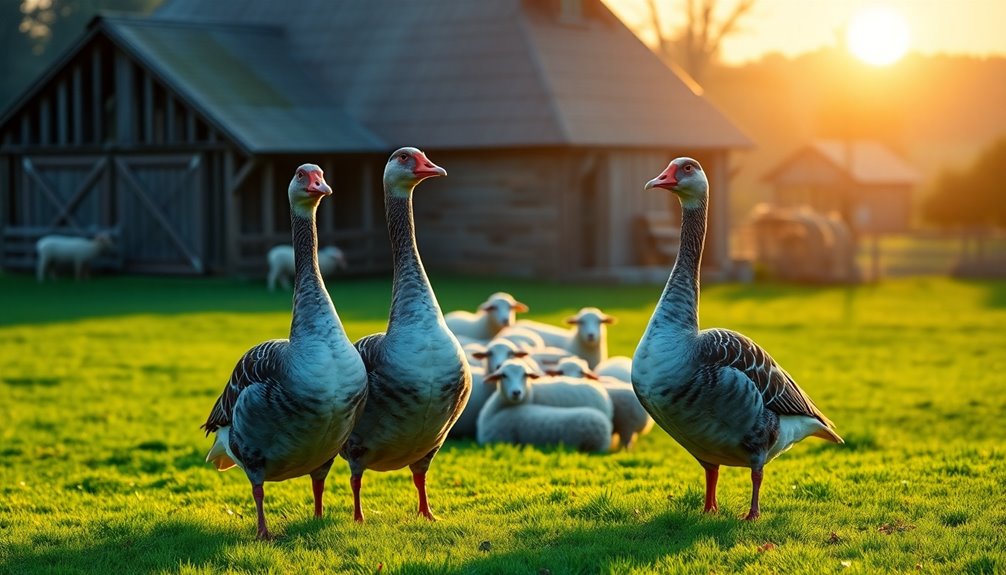
Having multiple geese on your farm not only boosts security but also enhances the overall health and happiness of your flock.
When you keep a group of geese, you'll enjoy several advantages:
- Enhanced Alertness: The collective honking of multiple geese creates a louder alarm system that can alert humans to potential threats more effectively than a single goose.
- Territorial Behavior: More geese mean increased territorial instincts, providing better protection against intruders.
- Social Interaction: With more geese, you reduce stress and loneliness, leading to healthier and happier animals, all while maintaining 24/7 vigilance.
Recommended Goose Breeds
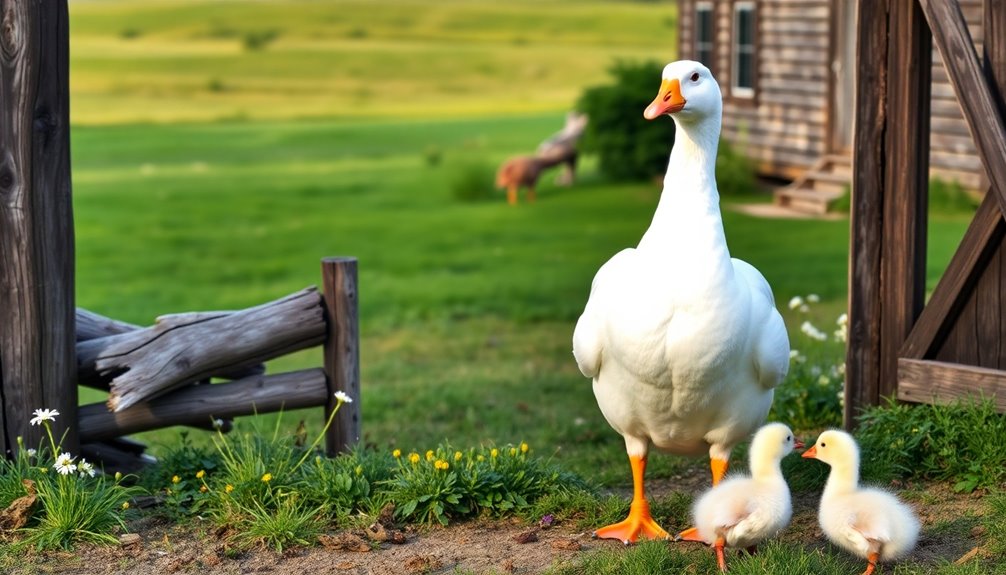
When selecting the right breed for your farm, it's crucial to reflect on the unique characteristics of various geese.
If you're looking for a reliable goose to guard your property, consider the Chinese goose. Known for their alertness and aggressive nature, they make excellent guardians while also being smaller and more docile if hand-raised.
African geese are another solid choice; their strong territorial instincts and loud honks enhance their guarding capabilities.
For a more imposing presence, Embden geese deter larger predators with their size.
Toulouse geese offer a calm demeanor, fitting well in mixed flocks, while Pilgrim geese are adaptable and hardy, serving as effective foragers and protectors of your other livestock.
Frequently Asked Questions
What Does "Goose Guarding" Mean?
"Goose guarding" means that geese take on the role of protectors for their territory, particularly when it comes to flocks like chickens.
You'll notice their loud honking alerts you to potential threats, making them effective watchdogs against aerial predators. Their strong territorial instincts drive them to deter intruders.
If you bond well with your geese, they'll likely showcase more protective behaviors, helping keep your farm safe and secure.
What Is the Best Goose for Guarding Chickens?
When it comes to guarding your chickens, think of a watchful sentinel, feathers fluffed and eyes sharp.
The Chinese goose stands out with its alertness and aggressive nature, making it a fierce protector. African geese, known for their loud honks, can also scare off potential threats effectively.
Don't forget the Roman geese, whose vocalizations keep danger at bay.
Whichever you choose, keep at least two together for the best protection and companionship!
Are Geese Protective of Owners?
Yes, geese are protective of their owners. Their strong territorial instincts drive them to guard their space and alert you to potential threats with loud honking.
With excellent eyesight and hearing, they quickly spot intruders and confront them rather than run away.
To enhance their protective behavior, it's crucial to bond with them in a familiar environment.
While they prioritize their safety, their loyalty to you can make them effective guardians.
Why Are Geese Used as Guard Animals?
Geese are used as guard animals primarily due to their loud honking, which alerts you to potential threats.
Their strong territorial instincts mean they confront intruders instead of fleeing, making them proactive protectors.
They're particularly effective against aerial predators, like hawks and eagles, that threaten smaller poultry.
When raised with chickens, geese often develop protective behaviors, boosting the overall safety of your flock.
Certain breeds, like Chinese and African, are especially vigilant.
Conclusion
Incorporating guard geese into your farm can truly enhance your security and companionship. With studies showing that a single goose can deter up to 90% of unwanted predators, it's clear these feathered guardians pack a punch. Plus, bonding with them not only provides protection but also enriches your farm life. Whether you opt for one or several, these loyal birds are sure to become invaluable members of your team, keeping both your property and your heart safe.

